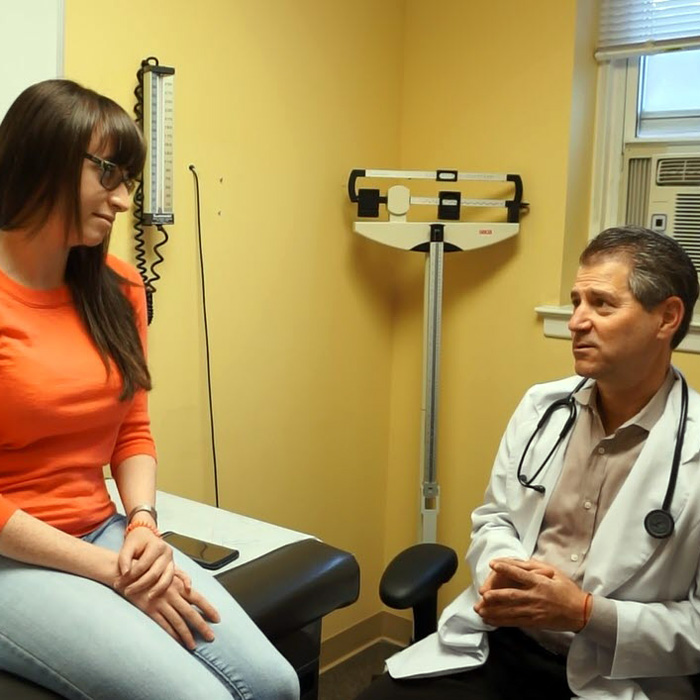Mast Cell Activation Syndrome
Mast Cell Activation Syndrome (MCAS) Doctor in NYC
Mast Cell Activation Diagnosis and Treatment
Mast cell activation syndrome is thought to be a common, yet under-recognized, chronic multi-system disorder that occurs when mast cells inappropriately activate. Mast cells are present in virtually every tissue of the body and release mediators which can have a range of effects on other cells which can manifest in a variety of symptoms. Therefore it is difficult for many doctors to accurately diagnose and treat mast cell activation syndrome (MCAS).
Dr. Dean Mitchell has over 20 years of experience diagnosing and treating illnesses that are difficult for many doctors to identify. He has the knowledge and experience to help you identify if you suffer from MCAS and effectively control it.

Symptoms Associated with MCAS
The most common symptoms associated with mast cell activation syndrome include:
- Skin Issues: hives, flushing, itching, rashes
- Gastrointestinal (GI) Issues: bloating, reflux, nausea, diarrhea
- Respiratory Issues: sneezing, wheezing, shortness of breath
- Cardiac Issues: palpitations, chest pain, low blood pressure
If you feel that you have been sick forever; have trouble with allergies and asthma; get facial and chest flushing; suffer from skin rashes that come and go; regularly get brain fog and headaches; have overreactions to insect bites, bee stings and chemcial intolerances; or suffer from poor wound healing and bruise easily you may have MCAS.
Factors that Can Cause MCAS
Mast Cell Podcast with Dr. Mariana Castells
Medicines that can trigger mast cells to activate include
- Opioids: codeine
- Anesthesia
- Antibiotics
Other miscellaneous factors that can activate mast cells include
- Foods: nuts, shellfish, strawberries
- Mold
- Electromagnetic radiation: cell phones
- Temperature changes
Telehealth Meeting Available
Schedule a virtual telehealth visit with Dr. Mitchell to find out if you suffer from mast cell activation syndrome and the treatment options available.
What is Mast Cell Activation Syndrome (MCAS)?
Mast cell activation syndrome or MCAS is a newly discovered disease that has been known about since the 1980s but only formally diagnosed as a disease in 2008. It has been a controversial classification as it doesn’t have any specific physical or laboratory findings that distinguish it from other related disesases but it’s prevalence is now almost 20% according to recent medical journals.
When someone has mast cell activation syndrome it means their mast cells are overactive and release chemicals in the body that cause a wide range of symptoms that mimic allergies, chronic fatigue syndrome, candida and a host of other diseases. This is way it is very difficult for the majority of doctors to accurately diagnose it.
To keep it simple: mast cell activation syndrome (MCAS) happens when the mast cells in your body release too much of the substances inside them at the wrong times.
What is a Mast Cell?
A mast cell is a white blood cell that is an integral part of our innate immune system. In fact, these cells were the original defense cells in evolutionary times when multi-cellular organisms were first developing different cells to handle all the functions of a multi-cellular body.
These cells are mainly found in tissue such as in the gastrointestinal lining, the nasal and lung tissue and skin. It is rare to be found in the blood. As part of the immune system, mast cells function to help our bodies detect, resist and recover from the huge array of threats that we face in the environment.
Mast cells have granules inside them that contain the chemicals: histamine, prostaglandins, and herparin. They are responible for the symptoms such as itching, sneezing, wheezing and bleeidng when the mast cells are active.

Diagnosing MCAS
MCAs is difficult to diagnose with great confidence as most doctors are not familiar with MCAS and it presents with a potential wide range of symptoms. Many people spend decades going around in circles visiting many different specialists and achieving no proper diagnosis. Thankfully, there are doctors now, like Dr. Dean Mitchell, who understand the issues and there are tests that can support a diagnosis.
Diagnostic criteria for MCAS was only recently agreed upon in 2011 and the criteria relies upon a number of factors which include:
- typical clinical symptoms
- evidence of mediator release and response to medication
- thorough discounting of any other potential diseases
The first challenge of suspected MCAS sufferers is to find a doctor who has the time and experience to assimilate a complicated medical history. Dr. Mitchell specializes in diagnosing and treating difficult to diagnose chronic illnesses. He is able to get results for people when many other specialists have failed and his first step in any diagnosis is taking a thorough medical history.
Tests Used to Diagnose MCAS
The following are tests Dr. Mitchell utilizes to diagnose MCAS.
- Tryptase levels: a 20% rise even if in normal level
- 24-hour urinary prostaglandin D2
- Histamine in the blood greater than 8nmol/L
- MMP-9 greater than 400
- Simple skin stroke test
How is Mast Cell Activation Syndrome Different Than Another Similar Named Disease – Mastocytosis?
Mastocytosis is a hematologic disease where there is an overabundance of mast cells. There are mutations of genes and abnormal bone marrow in some types. The c-kit 806 codon mutation is a way to make the diagnosis along with an abnormally elevated tryptase level.

Treating Mast Cell Activation Syndrome
Successful treatment of MCAS consists of incorporating a low-histamine diet, modulating immune response and stabilizing mast cells, and simultaneously addressing underlying triggers. All of these are key components to resolving the condition.
Some of the approaches Dr. Mitchell takes to treat mast cell activation syndrome can include:
- Low histamine diet
- Antihistamines to decrease histamine load in the body – Allegra and Zyrtec are great over-the-counter (OTC) choices
- Leukotriene antagonists – Monteleukast 10mg is safe and effective
- Cromolyn sodium – this is available as Gastrochrome which blocks some of the GI symptoms of the disease
- Natural remedies such as Quercetin and Vitamin C to lower histamine
- Sodium bicarbonate or baking soda to raise stomach pH and make the body more alkaline so mast cells don’t activate

Low Histamine Diet
A low histamine diet is pivotal in the successful treatment outcomes for MCAS. While the above treatments are very helpful, they build upon the foundation of dietary strategies. Consider a sinking boat that has a hole in the bottom – mast cell stabilizers and antihistamines are akin to bailing out the water with a tiny cup while the dietary interventions plug the hole.
A few foods that are high in histamine and should be avoided if you have MCAS include:
- spinach
- eggplant
- parmesan cheese
- tomatoes
- fermented foods – no leftovers
- avocado
Once a patient has incorporated a low-histamine diet, mast cell stabilizers and antihistamines are introduced to further calm the immune dysregulation and resulting inflammatory response.
Patient Testimonials
Dr Mitchell and his staff are excellent! I have been a patient for many years , too many to count . The staff has always been extremely helpful . Dr Mitchell was able to get me past , prior to seeing him, many seasons of allergies colds and asthma . With his help and advice I no longer stress about colds and allergies because I know I am in good hands .
I have been seeing Dr. Dean Mitchell for over a year now for pain management, and treatment. He has been incredibly kind and knowledgeable from the start, he takes time to listen and has gone above and beyond in regards to my health. The excellent care I have received at Mitchell Medical Care Group has helped to reduce and improve symptoms of pain I have struggled with for years, and the warm presence of the staff constantly make me feel welcome in the office.
I found the Drs. Dean and Ricki Mitchell to be very knowledgeable, compassionate and have truly helped in finding the root cause of my medical condition by thinking outside of the box. I am now on my road to recovery ❤️ I am so very grateful to have found them. The facility and staff are excellent and I highly recommend Mitchell Medical Group.
I can't overstate it: Dr. Dean Mitchell changed my life! I'm about five months into my Candida treatment and my skin looks and feels better than it has ever been. Everyone who works in his office is lovely and pleasant to deal with. I have recommended Dr. Mitchell to friends and would recommend his care to anyone!! His wonderful, caring practice has restored my faith in the medical community. Thank you, Dr. Dean!!
I have been seeing Dr. Mitchell and the other staff for over two years now. I go monthly for an IV treatment and to meet with the staff. Dr. Mitchell and his team have significantly helped with my healing process. They are always friendly, attentive, and genuine and I truly enjoy going to each Meeting. They are all extremely knowledgeable and have taught me how to correctly better my health and wellness. I highly recommend their office.
Request An Meeting
Virtual Telehealth Meetings Available!
Manhattan
57 W 57th St, Suite 601
New York, NY 10019
Rockville Centre
165 North Village Avenue, Suite 129
Rockville Centre, NY 11570
